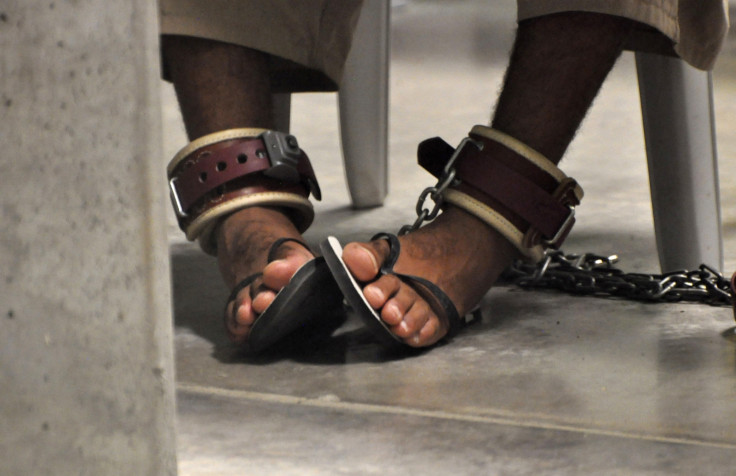Simon Heffer: Britain failed to prevent America's moral collapse over paranoid CIA torture
Before open season is declared on the Americans for the ghastly range of tortures they practised on suspected Islamic terrorists, let us praise them for being sufficiently transparent to publish a Senate report detailing exactly what those tortures were. That said, the activity was outrageous and profoundly counter-productive. Well might the CIA now say that it was "abhorrent".

One shudders, however, at the idea of a supposedly civilized western country that will pump food up men's rectums, kill them from cold or deafen them with 48 hours of Britney Spears. For such a culture to exist, as it did in once-civilised Germany between 1933 and 1945, suggests a profound moral collapse.
It remains to be ascertained just how much the British government knew about it. Ministers from Tony Blair downwards were determined to do all they could to assist America in the pursuit of those who plotted the attacks on 9/11. That was a noble aim; but it became ignoble when it entailed obtaining information by illegal means. And they were illegal. America could face trial in an international court for what happened. And any British minister found to be complicit should face justice too.
Perhaps it was the case that the success of terror plots and the murders of soldiers or civilians were prevented by information obtained via torture. We do not know. Even if so, it hardly justifies America reducing itself to a moral level where the Russians, the Chinese, the Iranians and the North Koreans can engage in synthetic outrage over the criticism they have endured from a country that has now outed itself as a serial human rights abuser. What it should mean is that Britain learns a long overdue lesson about just how very different America and the ways of America are from Britain and the ways of Britain. The old adage about America "not doing Empire" has never seemed so true.
With the Islamic State (Isis) taking as much of the Middle East as it can back to the 8<sup>th century, the challenges for the West in relation to Islamic fundamentalism have hardly abated. Indeed, they are more severe than they were before, thanks to the army of Jihadis out in Syria and Iraq, some of whom will return to the West not merely radicalised – they were that before they left – but bent on destruction. The confirmation of what some in the West have been doing to their co-religionists will only feed their fury.
America's default position against the Islamic threat has been one of extreme and random over-reaction. Britain's share of the guilt in this lies not just in turning the blind eye to American excesses, but in failing to counsel its main ally that moderation and calm in taking on this enemy might be more productive in the long run than acts of revenge and behaviour that will seem to many to smack of downright paranoia. With the British mainland in living memory having endured the Blitz and a 30-year IRA terror campaign, Britain had some authority in these matters.

Back in 1884 William Ewart Gladstone, the prime minister, was reluctant to send units of the British army to relieve General Charles Gordon in Khartoum, where he was trying to hold off the Islamic fundamentalists loyal to the Mahdi, because he thought it would smack of a holy war. America seems never to have been too worried about doing anything that smacked of holy war. The great triumph in dealing with the Muslim world was in 1991, in the shape of the coalition put together to drive Saddam Hussein out of Kuwait.
Engaging in holy war is allowing the Islamists to pick the territory upon which they fight. America – and Britain – need to enlist the help of more moderate Muslim nations, whose existence is threatened by the advance of Islamic State, and persuade them that their future depends of taking a lead in the fight against extremism. America may have the men, the materiel and the money to lead that fight, but it no longer has the moral authority. In all Britain's dealings with America in this cause, that needs to be fully understood.
Islamic State claims to be fighting a holy war, but it is in fact fighting one of simple, old-fashioned territorial aggression. That is how it needs to be countered. Britain too needs to signal comprehensively that the days of simply asking "how high?" when America says "jump!" are over.
Sir Malcolm Rifkind, who chairs the House of Commons Intelligence Select Committee, has demanded full information on what the British knew about torture, and has said that if any British agent was present at such brutality he would have been committing an offence. That is a start. But this is not just about torture, it is about a whole culture and a whole cast of mind. It is Britain's responsibility to impress upon its ally that as the alliance goes forward, it does so in a different culture.
Dr Simon Heffer is a British commentator and author who has written columns for The Daily Mail, The Daily Telegraph, The Spectator and The New Statesman. He is the biographer of Enoch Powell, Thomas Carlyle and Ralph Vaughan Williams and recently published High Minds: The Victorians And The Birth Of Modern Britain.
© Copyright IBTimes 2025. All rights reserved.






















